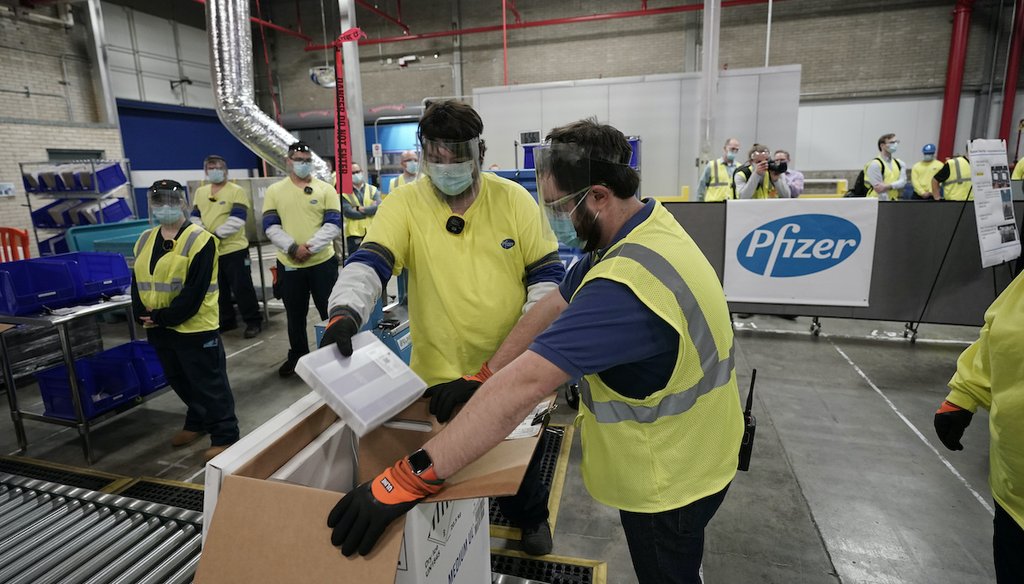

Our only agenda is to publish the truth so you can be an informed participant in democracy.
We need your help.


Workers prepare boxes of the Pfizer-BioNTech COVID-19 vaccine for shipment at a Michigan factory, Dec. 13, 2020. (AP)
For the vast majority of the time that the three COVID-19 vaccines have been administered in the U.S., they have been available through an emergency use authorization from the FDA. On Aug. 23, Pfizer’s vaccine became the first of the three to gain full FDA approval.
Only vaccines that have been approved by the FDA — a more rigorous process than emergency use authorization — can be advertised on TV.
A Pfizer spokesperson said the company does plan to market its vaccine under the name Comirnaty.
Big Pharma seems to be on television all the time, advertising prescription medicines with three- or four-syllable names for treating all sorts of problems, large and small.
There have been many public-service TV ads promoting vaccination generally. But one Instagram post claims that drug makers aren’t doing TV ads for their own COVID-19 vaccines because they would have to list the possible side effects.
"Have you noticed there’s been no commercials for the death dart?" the post begins, falsely suggesting that the COVID-19 inoculations are lethal. "Here’s why. Because in the US they are required by law to list all adverse side effects to medications advertised on TV to consumers. Fact check that."
The post was flagged as part of Facebook’s efforts to combat false news and misinformation on its News Feed. (Read more about our partnership with Facebook.)
The actual reason is that Food and Drug Administration rules prohibit advertising of drugs that have not been fully approved by the FDA. Only one COVID-19 vaccine, Pfizer’s, has been approved, and that didn’t occur until August.
A Pfizer spokesperson said the company plans to take a "thoughtful approach" to marketing and will adhere to FDA requirements about disclosing any serious side effects.
During public health emergencies, the FDA has the legal power to grant emergency use authorization to certain products if they meet specific criteria, and when there’s no adequate, approved and available alternative to treat the malady. That’s what happened when COVID-19 was declared a pandemic in early 2020 and there weren’t any approved vaccines for it.
Emergency use authorization was granted to the Pfizer and Moderna vaccines in December 2020 and to the Johnson & Johnson vaccine in February 2021.
FDA approval, meanwhile, depends on more substantial evidence that the product is effective and that its benefits outweigh its risks.
Approved medical products must follow numerous FDA regulations, including rules for ads that make claims about what a product can do.
So far, only Pfizer’s vaccine has gained FDA approval, and only for people age 16 and over. That occurred Aug. 23. The FDA’s announcement noted that Pfizer would now market its vaccine under the name Comirnaty.
The approval allows Pfizer to advertise Comirnaty on TV, but the company has not announced plans to do so.
Pfizer spokesperson Steven Danehy said "we cannot share our specific plans at this time. But we plan to take a thoughtful approach to marketing and advertising Comirnaty."
TV ads would be subject to FDA requirements, including that the ads must identify "the most significant risks of the drug."
Side effects from the vaccines have generally been mild.
Effects such as tiredness, headache or chills may affect your ability to do daily activities, but they are normal signs that your body is building protection, and they should go away within a few days, according to the federal Centers for Disease Control and Prevention. Serious side effects are rare.
More than 408 million doses of COVID-19 vaccines were administered in the United States from Dec. 14, 2020, through Oct. 18, 2021, according to the latest CDC figures. During this time, a reporting system run by the CDC and the FDA received 8,878 reports of death (0.0022%) among people who received a COVID-19 vaccine.
We have rated False claims that the vaccines have caused death. There is no clear evidence that the vaccines have caused any deaths.
An Instagram post claimed: "There’s been no" TV commercials for the COVID-19 vaccines because "they are required by law to list all adverse side effects."
The vaccine manufacturers have been kept from advertising their vaccines because FDA rules don’t allow advertising for drugs that have only emergency use authorization and not full FDA approval.
For the vast majority of the time that the three COVID-19 vaccines have been administered in the U.S., they have been available through an emergency use authorization. On Aug. 23, Pfizer’s vaccine became the first to gain FDA approval. Pfizer plans to advertise its vaccine in compliance with the FDA’s disclosure rules, a spokesperson said.
We rate the statement False.
Instagram, post, Oct. 15, 2021
USA Today, "Fact check: COVID-19 vaccine isn’t advertised on TV due to emergency authorization," Aug. 4, 2021
Food and Drug Administration, "Basics of Drug Ads," June 19, 2015
Email, Food and Drug Administration spokesperson Alison Hunt, Oct. 18, 2021
Food and Drug Administration, "Prescription Drug Advertising | Questions and Answers," June 19, 2015
Food and Drug Administration, "Advertising & Promotional Labeling Questions and Answers," March 16, 2018
PolitiFact, "Yes, Pfizer’s COVID-19 vaccine is FDA approved," Sept. 17, 2021
Centers for Disease Control and Prevention, "Key Things to Know About COVID-19 Vaccines," Oct. 7, 2021
Centers for Disease Control and Prevention, "Selected Adverse Events Reported after COVID-19 Vaccination," Oct. 13, 2021
CNBC, "From employer mandates to TV ads: What full FDA approval could mean for Covid vaccines," May 18, 2021
Quartz, "Why is Pfizer advertising a vaccine that gets plenty of free promotion?", published Sept. 18, 2021, last updated on Oct. 1, 2021
Email, Pfizer spokesperson Steven Danehy, Oct. 18, 2021
In a world of wild talk and fake news, help us stand up for the facts.
